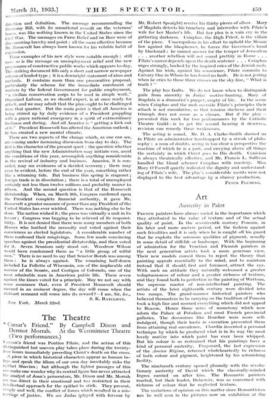The Theatre
" Caesar's Friend." By Campbell Dixon and Dermot Morrah. At the Westminster Theatre (Two performances.)
CAEsen's -friend was Pontius Pilate, and the action of this distinguished but uneven play takes place during the twenty- four hours immediately preceding Christ's death on the cross. A piece in which historical characters appear as human be- ings and speak the idiom of our own day inevitably risks the epithet Shavian ; but although the lighter passages of this one make one wonder why its central figure has never attracted the analyst of Joan's persecutors, Mr. Dixon and Mr. Morrah are too direct in their emotional and too restricted in their intellectual approach for the epithet to stick. They present, limply and well, the conflict of forces which resulted in a mis- carriage of justice. We see Judas (played with fervour by Mr. Robert Speaight) receive his thirty pieces of silver. Mary of Magdala detects his.treachery and intercedes with Pilate's wife for her Master's life. But her plea is a vain cry in the gathering darkness. Caiaphas, the High Priest, is the villain of the piece. Unscrupulous in his effort to uphold the Mosaic law against the blasphemer, he forces the Governor's hand by blackmail : he cannot answer for the temper of Jerusalem . . . another rebellion will not sound prettily in Rome . . . Pilate's career depends upon the death sentence . . . Caiaphas urges strongly, backed by the inspired cries of the Jewish mob. Against his wish, against his conscience, Pilate commits to Calvary One in Whom lie has found no fault. He is not jesting when he cries to those three crosses on the sky-line, " What is truth ? "
The play has faults. We do not know when to distinguish guile from sincerity in Judas' motive-hunting. Mary of Magdala is a dramatist's puppet, empty of life. In the scene when Caiaphas and the mob override Pilate's principles their attack is not cumulative, so that tension slackens and their triumph does not come as a climax. But if the play— presented this week for two performances by the Catholic Theatre Guild—is to get the second hearing it deserves, • revision can remedy these weaknesses.
The acting is sound, Mr. 1). A. Clarke-Smith showed us in Pilate an administrator handicapped by a streak of philo- sophy : a man of doubts, seeing in too clear a perspective the machine of which he is a part, and envying above all things the certainty in which Christ goes to His death. Cynicism is always theatrically effective, and Mr. Francis L. Sullivan handled the bland schemer Caiaphas with mastery. Miss Mary O'Farrell quietly indicated the dignity and understand- ing of Pilate's wife. The plays considerable merits were not displayed to the best advantage by a clumsy production.
PETER FLEMING.








































 Previous page
Previous page